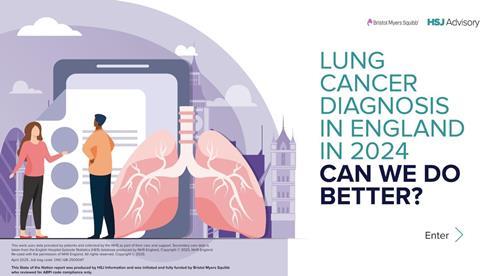Discussions and reflections from the HSJ Cancer Forum Panel discussion, 12 March 2025
Sponsored by and written for
Earlier this year, I had the opportunity to chair a BMS-sponsored session at the HSJ Cancer Forum titled “State of the Nation: A Deep Dive into Lung Cancer Diagnosis and Care”. The session coincided with the publication of a new HSJ Advisory Report, commissioned and funded by BMS, exploring national and system-level inequalities in lung cancer services across England. What emerged from the report and discussion was a stark, unfiltered look at the state of lung cancer diagnosis in England today.
The panellists brought deep clinical insight and experience to a discussion that was both sobering and urgent. Lung cancer remains the leading cause of cancer death in the UK. Despite two decades of reform, investment, and national strategies, more than 30 per cent of patients are still diagnosed through emergency presentation.
For NHS system leaders, this is not simply a data point. It is a system failure. More importantly, it is a public health red flag. We cannot expect different outcomes from the same structures. The time for marginal gains has passed. We need a decisive reimagining of our diagnostic pathways, service partnerships, and public engagement strategies if we are to shift the dial meaningfully on lung cancer survival.
Mental health: A critical blind spot
One of the most urgent findings in the report, and echoed in our panel, was the strong association between mental health conditions and late-stage lung cancer diagnosis. Patients with mental health conditions, particularly those aged 40-54, were far more likely to be diagnosed at stage 4 than those without mental health conditions. Over a four-year period, compared to those patients without mental health conditions, there were more than 2,000 excess late diagnoses among this group.
This is not just a failure of outreach, it’s a systemic blind spot. For too long, cancer care and mental health have operated in parallel rather than in partnership. But if we are serious about addressing health inequalities, we must embed early cancer detection efforts into mental health services.
Our panellists proposed practical actions:
- Train frontline mental health staff to spot symptoms and refer appropriately;
- Embed dedicated mental health nurses within lung cancer care pathways; and
- Tailor smoking cessation services to meet the needs of people with serious mental illness, recognising higher rates of tobacco dependence and social complexity.
Inequality starts at the front door
Deprivation continues to be one of the strongest predictors of poor outcomes in lung cancer. One of our panellists highlighted that in north east London – a region with high deprivation – 31 per cent of lung cancer cases are still diagnosed via accident and emergency.
We need to rethink access. Community-based diagnostic services, including mobile lung units, should no longer be viewed as “nice-to-have” pilots but as core parts of the diagnostic infrastructure. Co-designing these services with local residents and community leaders, from pharmacists to faith groups, will be essential for building trust and uptake.
Primary care also has a pivotal role to play but must be better supported. GPs are expected to detect vague symptoms in 10-minute consultations. We must lower the national threshold for chest X-rays, enable direct access to CT scans, and pilot open-access diagnostic models that streamline referral and reduce delay.
Data and digital: An untapped resource
The NHS has one of the richest primary care datasets in the world – but we’re not leveraging it effectively for lung cancer. We should be using data to proactively identify at-risk patients based on a broader set of risk factors, not just smoking history.
AI can help us scale this effort. AI tools that prioritise abnormal chest X-rays for faster reporting are already in use abroad and in some cities across the UK. It should be rolled out more widely here. These tools will help manage the workload and speed up diagnosis where workforce pressures are acute.
Screening: Vital, but not enough
An insight provided by one of the panellists was that the National Targeted Lung Health Check (TLHC) programme has been a significant success, with some regions, like north east London, seeing more than 60 per cent uptake. Yet, the programme’s eligibility criteria – age 55-74 with a heavy smoking history – means that fewer than 40 per cent of lung cancer patients will ever qualify.
We need to accelerate research into alternative risk stratification tools, including biomarkers and environmental or occupational risk factors. Expanding eligibility and boosting uptake among underserved groups should be a national priority.
Collaboration is non-negotiable
No single sector can fix this. Industry, too, has a responsibility that extends beyond drug development. As discussed at the forum, pharmaceutical companies can contribute by supporting community engagement, sharing data, and co-developing service models that prioritise equity.
We also need to ensure that innovation and best practice are not trapped in regional silos. Cancer alliances and integrated care systems must be supported to share, adopt, and scale successful models rapidly. A national innovation-sharing platform could help accelerate this.
In closing, the challenge of lung cancer is no longer just clinical, it is systemic. As system leaders, we have a duty to act on the evidence, not just acknowledge it. Our opportunity lies in turning these insights into action, restructuring services, rethinking equity, and re-engaging communities. The time for bold leadership is now.
This is not just an opportunity for impact, it’s an imperative. NHS leaders have the chance to transform lung cancer outcomes not incrementally, but decisively. Let’s stop reacting to emergencies and start preventing them. The lives we save will be the measure of our leadership. To find out how your locality is performing, access the report below (by clicking below you will be taken to a BMS website).
Job code: ONC-GB-2500220
Date of prep: July 2025
































